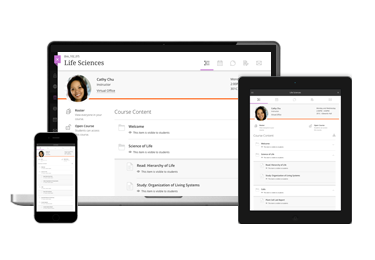You have /5 articles left.
Sign up for a free account or log in.

Blackboard
California State University at Sacramento, like more than a thousand other institutions in the U.S., uses the learning management system Blackboard Learn, but likely not for much longer.
Sacramento State is getting ready to upgrade. And like many institutions in its situation, the university is looking at systems that are hosted in the cloud and delivered as software as a service (SaaS).
Moving to the cloud normally means paying more, but it does come with some benefits. Virtually no downtime is a big one. Software providers can push new features and critical patches to all its customers in the cloud, instead of colleges having to take their systems offline for maintenance. Colleges also don’t need to worry about servers if their systems are hosted in the cloud.
Faculty members at Sacramento State are this spring testing out different systems. A committee plans to make a recommendation about which system to upgrade to before the end of the academic year, said Christine E. Miller, interim vice president for information resources and technology and chief information officer.
In an interview, Miller suggested the university will move to a different software provider. She said that during the demonstration phase, some faculty members had difficulties distinguishing between features currently available for Blackboard Learn and its new user experience, known as Ultra, and ones that will be introduced in the future. (Note: This paragraph has been updated to clarify the LMS selection process at Sacramento State.)
Blackboard isn’t winning among IT staffers, either. Miller suggested that moving to another Blackboard product won’t be any easier than to a product offered by one of its competitors, saying, “Most of those leading products all have migration tools that are pretty robust.”
She added, “Based on our progress to date with our project, I wouldn’t say that [Learn] is a front-runner at this point.”
More alarming for Blackboard is Sacramento State’s reason for upgrading. Despite the company’s assurances to the contrary, Miller said she believes Blackboard will soon end support for versions of Learn that aren’t hosted in the cloud.
“While they haven’t announced a specific sunset date for it, I think a sunset date is imminent,” Miller said.
Strategic and Internal Challenges
Between competition, the cloud and unclear messaging, the situation at Sacramento State is a microcosm of the situation Blackboard finds itself in.
Make no mistake: the company is still the market leader in the U.S. in terms of the number of colleges and students served. It also does far more than develop a learning management system. Blackboard has a significant presence in the payment system market, a respected analytics team and a service portfolio that includes accessibility planning, competency-based education, web conferencing and more.
In the learning management system market, however, Blackboard is being pulled between serving the needs of customers using its legacy software and proving that it can deliver a cloud-hosted, cleanly designed and feature-rich product. And the company’s decision to do everything and support everything is raising concerns about whether it is spreading itself too thin.
In interviews with Inside Higher Ed, analysts and industry sources in the learning management system market said they are seeing progress from the education giant but remain unconvinced.
“They’ve got a real challenge that they can prove to customers that moving to the SaaS model is much quicker and easier than switching LMS's, and I haven’t seen that yet,” said Phil Hill, an ed-tech consultant.
However, competing in the SaaS market creates a new set of challenges.
As some Blackboard customers move to the cloud-hosted version of Learn, the company faces the same issue plaguing companies such as Microsoft and Google: fragmentation, where users simply don’t update to the most recent version of the software (in fact, a survey released this month showed 52 percent of businesses across the world are still using Windows XP in some way. The operating system was released in 2001, and Microsoft ended support for it in 2014).
Any attempt to phase out support for older versions in an effort to force customers to upgrade will undoubtedly draw the attention of Blackboard’s competitors, as it has in the past. After the company in October 2014 announced a final end-of-life date for Angel Learning, which it acquired in 2009, it lost many of those customers to rival companies.
On top of those strategic challenges, Blackboard has dealt with internal changes. The company has carried out several waves of layoffs during the last several years. Last year, the company also replaced its CEO.
“I don’t envy the position they’re in,” said John Baker, CEO of D2L, one of Blackboard's competitors. “I envy the client base they have. Of all the transitions I’ve seen in the space, they’re probably going through the biggest and hardest one that they’ve had to go through. But at least they’re trying.”
Waiting for Ultra
Why is the cloud important? For one, Blackboard’s competitors -- companies such as D2L and Instructure -- have been there for years. Blackboard first announced its cloud-hosted version of Learn in 2014.
Edutechnica, an ed-tech blog, found an “encouraging trend” for Blackboard in its latest look at the learning management system market in the U.S.: More than 50 colleges are using the cloud-hosted option this spring, up from a mere seven last fall.
Running the cloud-hosted version of Learn is also the only way colleges can activate the optional Ultra experience, Blackboard’s long-in-the-works redesign, which the company hopes will help it shed its image as an uncool, inflexible software giant whose system faculty members and students inevitably end up wrestling with.
Yet after multiple delays, the Ultra experience is still missing features compared to the “Original experience” that most colleges are familiar with. Assessment and grade-book features, in particular, are keeping some colleges from using the Ultra experience full-time.
“It’s got what certain schools need but not what everybody needs,” Katie Blot, chief strategy officer at Blackboard, said, estimating that the Ultra experience covers 70 to 80 percent of colleges’ use cases. Blackboard is issuing regular updates to add new features, she said.
While some colleges have completely made the switch to the Ultra experience, most of them moved from homegrown systems with limited feature sets, Blot said.
Blot said she anticipates that the Ultra experience will be “ready for everybody other than some super-fringe cases” come summer 2018.
'Trying to Do Too Many Things'
Like the cloud-hosted version of Learn, the Ultra experience is intended as an additional option, not a replacement. Blackboard has committed to support both user experiences -- it has recently introduced new features to the latter to make it look and act closer to the former -- and all three deployment methods: self-hosted, managed hosted and cloud hosted.
Ending support for versions of Learn not hosted in the cloud “is absolutely not in our plans,” Blot said. Blackboard isn’t worried about fragmentation; in fact, the company sees its range of hosting options and user experiences as a “key differentiator” in the market, she said. Some of its government or private-sector customers, for example, want the security of running their own servers, she said.
To simplify its product range, Blackboard explains that understanding Learn is “as easy as 1-2-3.” Broadly speaking, the company offers one learning management system (Learn), two different interfaces (Original and Ultra), and three different deployment options -- self-hosted, managed hosted and cloud hosted.
“Each institution has their own needs, so we’re not going to decide what’s best for them,” the company said in a 2016 blog post. “That’s why we provide multiple deployment options -- and it’s why we are going to continue to support our self-hosted and managed-hosted implementations indefinitely. When (and if) a move to SaaS is right for you, that’s up to you. If you prefer hosting Learn yourself, or you like the managed-hosted solution we’re providing, we’re not going to force you to change.”
But Blackboard has used the term “indefinitely” in the past before changing its mind. When it first announced the acquisition of Angel Learning, the company detailed plans to sunset the system after five years. Then in 2012, the company changed course, saying it would support Angel “indefinitely.” Two years later, Blackboard again changed its mind, announcing plans to end support for Angel in October 2016.
Glenda Morgan, a research director with Gartner who specializes in ed-tech strategies, said “a lot of clients are anxious” about whether Blackboard can deliver on its promises and worry that its plans could change in the near future.
Morgan, who speaks with officials at hundreds of colleges a year about learning management systems, said cases such as the back-and-forth on whether to end support for Angel has created a trust problem. “Blackboard hasn’t always been as clear in their messaging as we’d like them to be,” she said.
She compared Blackboard to Instructure, whose cloud-based learning management system, Canvas, has in less than a decade captured about one-fifth of the market in the U.S., according to Edutechnica’s data.
Other than its technology, Instructure also brought a different corporate culture to the market, including an “honest and straightforward” way of interacting with customers, Morgan said.
“Instructure is really blunt with clients, and that can be annoying,” Morgan said. “The upside is that when they actually say ‘Oh, yes, that’s a problem -- we’re going to fix it,’ they actually go and do it.”
Blackboard, in comparison, “is trying to do too many things and not disappoint many people,” Morgan said. “Down the road that means a fragmented and unsustainable model. … They need to figure out what the strategy is and just be really clear about it, and then if they end up changing it, be really honest about it.”




